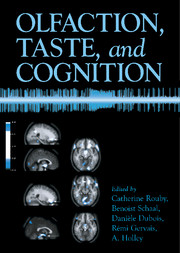Section 3 - Emotion
Published online by Cambridge University Press: 21 September 2009
Summary
Going against the Cartesian tradition, Darwin considered emotions as behavioral adaptations, “useful habits” inherited during phylogeny. Many authors think of olfaction in much the same way: Like emotion, olfactory perception challenges rational explanations of the world, and language itself. In the nineteenth century, efforts were made to find links between such perceptions and knowledge, which in turn implied a questioning of established knowledge. As psychologists, Hermans and Baeyens (Chapter 8) are specialists in a form of learning: evaluative conditioning, which supposes no awareness of the contingency between conditioned and unconditioned stimuli and is resistant to extinction. They have designed “ecologically valid” experiments, such as a bathroom study and a massage study, showing how emotional valuations of odors can be acquired and also changed during adult life without awareness. Such experiments, if they confirm that olfaction is an emotional sense, may also indicate that emotional processing of odors does not differ from emotional processing in other modalities. This is in contrast with memory processing, as will be discussed in Section 4.
In Chapter 9, Rouby and Bensafi question the concept of a hedonic dimension as a continuous variation between pleasantness and unpleasantness. They gather convergent cues from different disciplines indicating that hedonic judgment can distinguish two main types of odors: those that may have meanings and possibly attributes, and those that primarily have effects on the perceiver (see Section 2). Moreover, they propose the hypothesis that faster and more automatic neural networks subserve the processing of unpleasant odors.
Information
- Type
- Chapter
- Information
- Olfaction, Taste, and Cognition , pp. 117 - 118Publisher: Cambridge University PressPrint publication year: 2002
